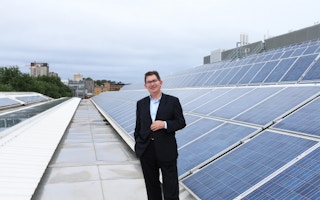In a world first for a university, the University of New South Wales (UNSW) on Monday announced that it will be able to meet all of its energy needs using renewable power from next year, and make its energy use carbon neutral.
To continue reading, subscribe to Eco‑Business.
There's something for everyone. We offer a range of subscription plans.
- Access our stories and receive our Insights Weekly newsletter with the free EB Member plan.
- Unlock unlimited access to our content and archive with EB Circle.
- Publish your content with EB Premium.
This is thanks to a three-way arrangement the Sydney-based university signed with Chinese renewable energy developer Maoneng Australia and electricity retailer Origin Energy that takes the form of a power purchase agreement (PPA).
Under this agreement, which was signed in mid-December, UNSW will from the beginning of 2019 purchase up to 124,000 megawatt hours (MWh) of renewable energy a year from Maoneng’s Sunraysia Solar farm in South Western New South Wales—that’s enough to meet all of the university’s annual energy needs.
This solar supply agreement, which will run for a period of 15 years, is accompanied by a three-year retail firming contract with Origin Energy. Retail firming is a practice in which the retailer commits to ensuring that a customer’s energy demand is met even if the availability of intermittent renewable energy temporarily falls short. Origin itself has a target to have 25 per cent of its generation mix from renewables by 2020.
This tripartite agreement that brings together a private sector client, a retailer, and developer is the first of its kind in Australia said UNSW, adding that it believes it will become the world’s first university to become fully solar powered and energy carbon neutral.
Other universities in Australia have achieved, or are working towards, carbon neutral status. Charles Sturt University in July 2016 claimed to have become Australia’s first carbon neutral university through the purchase of carbon offsets, and Melbourne’s Monash University last October outlined an aim to become fully renewable powered and carbon neutral by 2030.
Ian Jacobs, president and vice-chancellor, UNSW, said in a statement that “this landmark initiative is an exciting step towards realising UNSW’s goal of carbon neutrality on energy use by 2020 and reflects our commitment to making a positive global impact”.
“The Solar PPA arrangement will allow UNSW to secure carbon emission-free electricity supplies at a cost which is economically and environmentally attractive when compared to fossil fuel-sourced supplies,” added Jacobs.
“
Until UNSW pulls its funding from Santos, and other coal, oil and gas businesses, the thousands of students, staff and alumni behind the Fossil Free UNSW movement will continue to campaign for necessary climate leadership and fossil fuel divestment.
Pip Louey, co-convener, Fossil Fee UNSW
Kevin Chen, project finance director, Maoneng, said that the collaboration with Origin and UNSW was a model that was workable not only for the university “but can be replicated and tailored to fulfil the specific needs of each customer”.
As part of the PPA between UNSW and Maoneng, an annual scholarship worth A$10,000 (US$8,000) will be offered to students studying at Balranald Central School—which is located close to the planned solar farm in rural NSW—to attend UNSW. The university will also deliver presentations on renewable energy technology and industry trends to the students.
The Sunraysia Solar Farm is set to begin construction later this year; in addition to the PPA with UNSW, energy generated on the farm will also fulfil a deal that Maoneng inked with electricity retailer AGL in December 2017 to supply 800,000 MWh of renewable energy annually for 15 years.
Don Harwin, New South Wales minister for energy, commended the deal, noting that not only was it great for the environment, it would also deliver jobs and investment in regional New South Wales.
Climate activists also welcomed the news. Pip Louey, co-convener of Fossil Fee UNSW, a campus advocacy group, said in a statement that the shift to 100 per cent solar energy was “a positive step by the university”, and came after four years of campaigning by staff and students to encourage the university to fully divest from fossil fuels.
The university still has investments in oil and gas company Santos and other fossil fuel firms, noted Louey. In a 2014 statement, UNSW said it held investments of about A$50 million in a portfolio of A$309 million in companies involved in fossil fuels.
Louey added: “Until UNSW pulls its funding from Santos, and other coal, oil and gas businesses, the thousands of students, staff and alumni behind the Fossil Free UNSW movement will continue to campaign for necessary climate leadership and fossil fuel divestment.”










